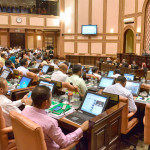Transparency Maldives has published its 2014 Majlis review, reporting that 10 bills were passed in 59 sittings of the 18th People’s Majlis.
Of the 85 members elected to the expanded parliament in March, only 16 have had a flawless attendance record since, with an overall attendance figure of 90 percent.
The members from the opposition Maldivian Democratic Party (MDP) had the worst average attendance of the three main parties – 85 percent, compared with the Jumhooree Party’s (JP) 91 percent and the ruling Progressive Party of Maldives’ (PPM) 93 percent.
It was the Maldivian Development Alliance leader, and Progressive Coalition member, Ahmed ‘Sun Travel’ Shiyam who had the worst attendance of any MP, appearing at less than half the sessions, reported Transparency.
Other than the Adhaalath Party, for whom Makunudhoo MP Anara Naeem is the only MP, Siyam’s MDA was the only party whose representation in the 18th Majlis has remained stable.
Despite winning 33 seats in the March polls, the PPM has now gained an additional 11 MPs, while its former ally the JP has a net loss of 2 seats.
After winning a disappointing 26 seats in the house, the MDP lost 4 MPs to opposition parties as well as expelling Majlis Deputy Speaker ‘Reeko’ Moosa Manik from the party.
Legislation
The most important legislative changes brought by the Majlis in 2014 were the Anti-Money Laundering and Counter-Terrorism Financing Act, the new Penal Code, the Special Economic Zone Act, and amendments to the Judicature Act.
The report describes the benefit of the money-laundering bill as preventing terrorism financing, kleptocracy, narco-trafficking, human trafficking, illicit arms trafficking, counterfeiting currency, corruption, and transnational organised crimes.
“Money laundering has potentially destructive social and economic consequences. It allows criminals such as drug traffickers, corrupt officials, and transnational organised crime syndicates to introduce illicit proceeds or ‘dirty money’ into legitimate finance streams as legal funds,” explained the anti-corruption NGO.
The new penal code – to be introduced in April this year – represents the culmination of 10 years’ work and will replace an old code that has been described by legal experts as obstructing the course of justice due to its “outdated” nature, read the review.
“In April 2004, the new penal code was finally passed, making it the first modern, comprehensive penal code in the world to incorporate the major tenets and principles of Islamic law.”

The report described the government’s flagship Special Economic Zones Act as laying “an edifice for economic, industrial, social, financial and infrastructural development.”
“It allows economic activities to be carried out under a relatively liberal manner through tax exemptions to investors and developers.”
Despite the promise of major ‘transformative’ investment – yet to be realised, the opposition has argued that the bill will “allow the government to conduct transactions broadly with no transparency and no opportunity for oversight, as a result of which the possibility of losing the country’s independence and sovereignty would be high”.
The SEZ was passed in August in the face of 300 proposed MDP amendments.
Appointments and dismissals
Regarding the changes to the Judicature Act – which facilitated the removal of two Supreme Court judges – Transparency’s report pointed out its previous concerns over the “political influence on the judiciary in the Maldives”.
Amendments requiring the reduction of the bench from seven to five in December saw the JSC swiftly select Chief Justice Ahmed Faiz and Justice Muthasim Adnan in a decision marked for its lack of transparency.
The Majlis’ subsequent approval of the pair’s dismissal was described as a “black day for the constitution” by Faiz, while UN Special Rapporteur Gabriella Knaul predicted a “chilling effect” on the work of the judiciary.
Finally, the review of the Majlis’ work for 2014 noted the appointment of a number of key figures, including Prosecutor General Muhuthaz Muhsin – appointed after political wrangling saw the constitutionally mandated deadline for filling the position missed by six months.
After the Supreme Court removed the Elections Commission’s senior leadership less than a month before the Majlis elections, MPs appointed Mohamed Shakeel and Ahmed Sulaiman to the commission in November. They were also joined by Ismail Habeeb Abdul Raheem and Amjad Musthafa in receiving Majlis approval.
The Majlis appointment of President Abdulla Yameen’s nomination of Hassan Ziyath as the new auditor general in November was also a source of controversy, with outgoing auditor general Niyaz Ibrahim arguing that his removal had been unconstitutional.
Niyaz was ousted as a result of last minute changes to the Auditor General’s Act, proposed to the the Majlis by the PPM on the same day the audit office published a report implicating tourism minister and deputy PPM leader Ahmed Adeeb in a US$6 million corruption scandal.
Related to this story
Transparency Maldives notes “grave concern” over undemocratic trends
Building trust – Transparency Maldives calls for enhanced asset disclosure
Transparency Maldives concerned over “stagnation of democratic consolidation”





